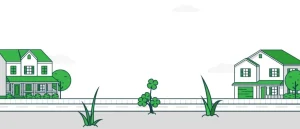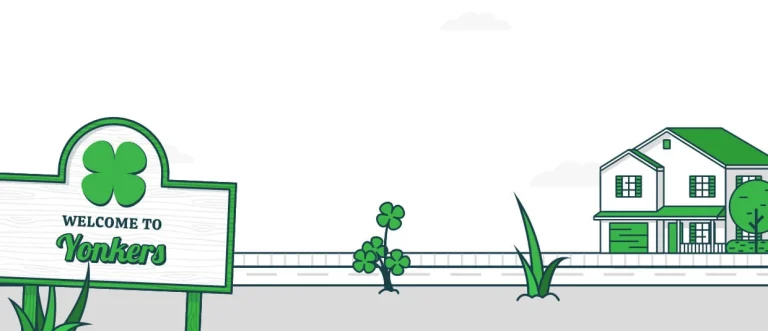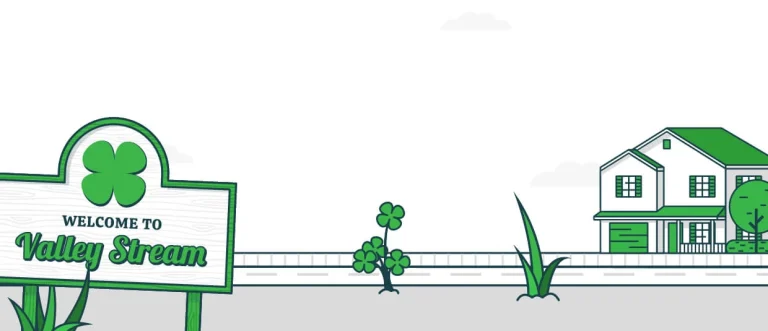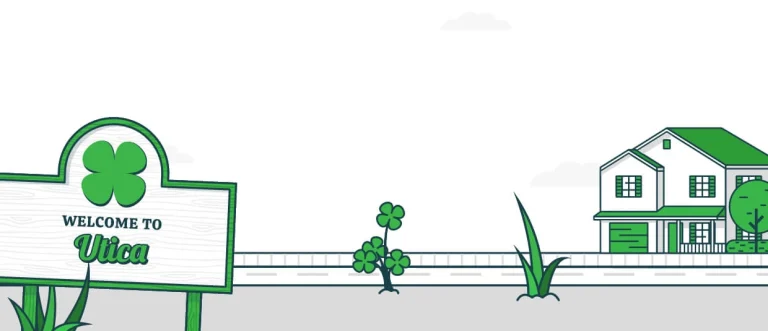Homeowners in New York must battle the winter elements and, if near the coast, be wary of hurricane season in the Atlantic. One of the best ways to achieve peace of mind from potential property damage is with homeowners insurance.
Below, we’ll go over everything you need to know about home insurance in New York so you can make an informed decision before you buy a policy. Keep reading to learn about the average home insurance cost in New York and some of the best homeowners insurance companies in the state.
How Much Is Homeowners Insurance in New York?
Homeowners insurance in New York costs about $1,563 per year for $300,000 of dwelling coverage. But, know that homeowners insurance rates in New York will vary based on many factors, including how much coverage you need.
Larger, more expensive homes need more dwelling coverage, which is based on the value of your home accounting for materials, labor, and construction costs. The greater your house cost (namely, replacement cost), the more dwelling coverage you need, and the higher your premiums will be.
Look at the table below to see how the average costs of New York homeowners insurance can vary by coverage amount.
| Dwelling Coverage Amount | $250,000 | $300,000 | $400,000 |
|---|---|---|---|
|
Annual Premium |
$1,170 | $1,563 | $2,182 |

It’s Time to Switch Your Homeowners Insurance
We partner with the nation’s top homeowners insurance companies so you can get a custom policy at an affordable price.
What Does Homeowners Insurance in New York Cover?
Although the cost of every homeowner’s insurance plan will vary, each policy’s coverages are standard. A home insurance policy is a package policy made up of six different types of coverage.
| Coverage | Definition |
|---|---|
|
Dwelling Coverage |
Dwelling coverage might be the first coverage you consider when you think about home insurance. It protects the physical structure of your house and its attached components. Your roof, walls, floors, patios, wiring, pipes, and air conditioning unit all fall under dwelling coverage. |
|
Other Structures Coverage |
Other structures coverage covers the fixtures and features on your property not attached to your main house. These can include fences, decks, sheds, pools, and more. |
|
Personal Property Coverage |
Personal property coverage covers your belongings, such as furniture, clothes, jewelry, electronics, tools, and more on and around your property. |
|
Loss of Use Coverage |
Loss of use coverage is only applicable if you’re forced to move out of your house after damage from a covered peril. If you need to move out while your insurer repairs your home, they can pick up the tab for your lodging, food, gas, and more through loss of use coverage. |
|
Liability Coverage |
Personal liability coverage financially safeguards you if you’re found liable for an accident where someone gets injured on your property. Personal liability coverage can cover potential settlements and legal fees. |
|
Medical Payments Coverage |
Like liability coverage, medical payments covers accidental injuries to others, but on a much smaller scale. While liability coverage may cover the injured person’s costs to get major surgeries, loss of income, or rehabilitation costs, medical payments may cover X-rays or stitches. |
Best Home Insurance Companies in New York
The best home insurance company in New York will vary by person. It’s hard to recommend one option because what may be best for you may not be the best for someone else, depending on your financial situation and coverage needs.
Allstate, Chubb, State Farm, and Travelers top the list of insurance companies in New York in terms of size, as they are the national carriers with the largest shares of the state’s market, while New York Central Mutual (NYCM) is one of the most popular regional carriers. You should compare quotes from several providers when looking for the best home insurance companies in New York to see who has what you need at the best price.
But, the best choice may not always be the cheapest. You don’t want to sacrifice necessary coverage to save a few dollars. Plus, you may need endorsements that some carriers may not have, or you might like the customer service of a pricier company over a cheaper one.
Who Has the Cheapest Homeowners Insurance in New York?
Nevertheless, it’s always helpful to compare average home insurance costs. Based on our table below, NYCM has some of the cheapest coverage in New York. Take a look at them and some other major carriers in the state to see who else offers cheap homeowners insurance in New York.
| Company | $200,000 Coverage | $300,000 Coverage |
|---|---|---|
|
Allstate |
$1,374 | $1,400 |
|
Nationwide |
$1,157 | $1,317 |
|
New York Central Mutual |
$707 | $875 |
|
State Farm |
$1,062 | $1,381 |
|
Travelers |
$1,158 | $1,369 |
Remember that the exact price of these plans from New York homeowners insurance companies will vary. There’s no guarantee that a plan will be a certain price until you get your quote. For example, Allstate insurance in New York had the highest cost on our list, but you may qualify for discounts when quoting with them that can lower your premiums. Nationwide in New York had the third highest premiums in our table, while New York State Farm rates came in just below them.

It’s Time to Switch Your Homeowners Insurance
We partner with the nation’s top homeowners insurance companies so you can get a custom policy at an affordable price.
What the Best Homeowners Insurance in New York Looks Like
Since you have much control over your policy limits and coverages when quoting, you should ensure that the policy you’re seeking is ideal for your circumstances. Policy-wise, the best plan in New York will have a sufficient amount of coverages A through F and possible endorsements based on your living situation.
For instance, let’s say you own a home with a $300,000 replacement cost. That means you’d need around $300,000 worth of dwelling coverage. The best homeowners insurance in New York for that would look something like this:
| Coverage | Amount of Coverage |
|---|---|
|
Dwelling |
$300,000 |
|
Other Structures |
$30,000 |
|
Personal Property |
$150,000 |
|
Loss of Use |
$60,000 |
|
Personal Liability |
$300,000 |
|
Medical Payments |
$3,000 |
Your other structures coverage is typically 10% of your dwelling coverage. You can change how much personal property coverage you want based on the value of your belongings, but providers often suggest a limit of around 50% of your dwelling coverage. The best home insurance in New York also lets you schedule your most valuable items that are limited under standard personal property coverage.
You can also adjust your personal liability and medical payments coverage amounts. Insurers usually require you to carry a minimum of $100,000 of liability coverage, but they always recommend carrying more. It’s often worth raising your liability limits because it affects your premium much less than raising property coverages.
Be sure to ask your provider about optional endorsements, too. You can get inflation guards or ordinance and law coverage to help with potentially increased building costs. You can also purchase additional windstorm or hail coverage if it’s not in your policy by default.
What to Know About Co-op Insurance in New York
New York City has thousands of co-ops, a unique type of housing not found in most cities. Co-ops still need insurance coverage. While traditional homes require an HO-3 policy, co-op insurance in New York is provided by a different type of home insurance plan called the HO-6 form.
HO-6 policies are for places with common areas, like condos and co-ops, because they have slightly different coverage needs than houses. For example, condos and co-ops don’t need other structures coverage in the policies.
HO-6 plans cover many forms of damage to your unit while limiting coverage in common areas to work in accordance with the building’s association or master policy. If you need New York co-op insurance, be sure to get quotes for condo insurance and not standard homeowners insurance.
In other places in the state where mobile homes are more common, property owners will need mobile home insurance in New York for their dwellings. Mobile home insurance is satisfied through an HO-7 policy, which also differs slightly from HO-3 coverage.
How a New York Home Insurance Agency Can Help
A home insurance agency is staffed with professionals whose job it is to find you the right coverage. Independent New York insurance agents, like our team at Clovered, take your information and shop it among their partners to find the best deal.
Note the difference between Independent agents and captive agents. Captive agents represent only one insurance provider and sell coverage on that company’s behalf. Captive agents are experts in coverage offerings from one company. They can still be helpful, but an independent agent will be familiar with several carriers and better help you save money through shopping around.
You may also encounter an insurance broker. A New York insurance broker will still shop around with several companies to find you the best deal, but they can’t officially bind coverage. They’ll eventually hand your information off to the insurance company or another agent to seal the deal, but they can still shop around for you. An independent agent would eliminate the need for a broker.
Factors That Affect the Average Home Insurance Cost in New York
As we touched on earlier, the average home insurance cost in New York varies based on many factors. Insurance companies examine many relevant variables to determine your risk accurately. They won’t offer policies to someone who is too risky, as it may end up costing them too much in claims.
Some of the most important factors that affect your premium are:
- Location
- Home age
- Home construction
- Policy deductible
- Claims history
Your home’s location is vital in determining your property’s risk. For instance, if you’re on the Atlantic coast in New York, you’re much more exposed to hurricanes than inland homes, so you’ll likely have higher premiums. You may also pay more if you’re in a high-risk flood zone or a high-crime area.
Older houses tend to have higher premiums than newer homes. Older houses have more issues that can lead to claims, such as old roofs or worn siding. Older homes may also be inherently more dangerous than newer homes if they’re not up to the latest building and safety codes. Your insurer doesn’t expect you to update your entire home. Instead, they charge you higher insurance New York homeowners insurance rates.
Relating to the way your home was built, insurance companies also take into account the materials used in your property’s construction. Masonry (brick) homes sometimes have lower premiums than wooden frame homes because they’re sturdier and less prone to fire damage.
You choose your policy deductible when you get New York homeowners insurance. Your deductible is the amount you must pay on a claim before your provider steps in to cover the rest of the bill. So, the damage must exceed your deductible before you can file a claim.
Carriers reward policyholders who choose high deductibles with low New York house insurance premiums. Be wary of making your deductible too high, though, or else your provider may not be able to help you with damage when you need it.
Insurers also examine a policyholder’s claims history when determining premiums. Companies believe someone who has filed several claims recently is more likely to file again. This is a larger financial risk for an insurer, so they will charge that person higher premiums.

It’s Time to Switch Your Homeowners Insurance
We partner with the nation’s top homeowners insurance companies so you can get a custom policy at an affordable price.
Is Homeowners Insurance Required in New York?
No, homeowners insurance, sometimes called New York fire insurance, isn’t required by law in the state. But, if you have a mortgage, your lender will require you to maintain a home insurance policy for the life of your mortgage. This protects your and your lender’s financial investment in your property.
Many homeowners with mortgages have escrow accounts through which you’ll pay your property fees, including your homeowners insurance. If you stop paying your premiums, your carrier will notify your lender.
If you lose your home insurance, your lender can force-place insurance on you. Force-placed insurance is more expensive and less comprehensive than standard home insurance. You should avoid it by paying your premiums on time.
Once you pay off your mortgage, no one will require you to keep your coverage. But, if you get rid of it, you’ll be responsible for paying for any home damage out of your pocket entirely.
New York Flood Insurance Needs
It’s important to realize that home insurance doesn’t cover flooding. Floods are the nation’s most common natural disaster. Just one inch of floodwaters can cause over $20,000 in damage, according to the Federal Emergency Management Agency (FEMA). If you are interested in flood insurance in New York, you need a separate policy.
The National Flood Insurance Program (NFIP) provides most of the flood policies in the country. The NFIP is subsidized by the government and administered by FEMA, which also creates the nation’s flood risk maps. You can check your flood zone on the FEMA website. Homeowners in high-risk flood zones are sometimes required by their mortgage lenders to get flood coverage.
Whether you want flood insurance from the NFIP or a private flood insurer, our team at Clovered can help you find the right coverage.

Stay Above Water With Flood Insurance
Do you want to pay for costly and common flood damage yourself or have an insurance policy pick up the tab?
New York Homeowners Insurance Laws to Know
Home insurance companies in New York have certain rules and regulations they have to follow outlined by state governments. These range from communication procedures to certain discounts and cancellation requirements.
Hurricane damage in New York can be costly for residents and insurers, as evidenced by Hurricane Sandy in 2012. Some people may experience very high rates in hurricane-prone areas. In these cases, you can take certain precautions to save money on home insurance.
If you install hurricane shutters, hurricane-resistant windows, or other storm mitigation measures, insurers are legally required to offer you discounts in New York. This is called wind mitigation, and you should look into it if you live in a coastal area in the state.
If you file a claim, a company must acknowledge and reply to it within a certain amount of time, although there’s no limit to how long a claim can stay open. Also, if a company decides not to renew your policy, they must notify you at least 45 days but not more than 60 days before the plan’s expiration date. Note that there is a difference between cancellation and non-renewal.
New York Insurance Cancellation Requirements
If an insurance company cancels your policy, they stop your coverage immediately. If they non-renew your policy, then your policy will stop at the end of your policy term. New York has certain insurance cancellation requirements.
The first 60 days your policy is active is called the underwriting period. During this time, your insurer is double-checking that your policy is accurate and meets all their criteria. Most policies are fine, but an insurer sometimes finds something worrisome and cancels a policy. As long as the cancellation notice states the specific reason for the cancellation, an insurer can do this, although it doesn’t happen often.
After the first 60 days, New York State homeowners insurance regulations stipulate that a carrier can’t cancel or non-renew your policy for three years – except for a few specific reasons, like if you stop paying your premiums or they find you lied or misrepresented yourself in your paperwork. They may also cancel your policy if you tried to commit arson or other illegal activities or did something to make your property uninsurable.
Homeowners Insurance for Older Homes in New York
New York State has some of the oldest houses in the country, on average, with a median home age of over 60. Many insurance companies have rules regarding especially old houses that require aso you need a special type of homeowners insurance for older homes in New York.
Property age restrictions vary by company. But, generally, any house over 100 years old will not be eligible for standard homeowners insurance, officially called an HO3 policy. Instead, especially old houses will need an HO8 policy.
Older homes in New York are harder to insure for a couple of reasons. They often have very unique or hard-to-replicate fixtures and features that would be very costly to replace if damaged. Also, old homes tend to have more problems leading to insurance claims, like not being up to the latest building codes or having old roofs, pipes, or other outdated elements.
Thus, HO8 policies are typically written on an actual cash value basis. They may also cover fewer perils.
How to Get Homeowners Insurance Quotes in New York
To compare policies, you’ll need to get several New York home insurance quotes. Clovered makes this easy. When you shop for insurance at Clovered, you get quotes from several of the insurance companies in your area.
We’re an independent insurance agency, and we’ve helped over 30,000 find and maintain coverage on all their needs for New York property insurance. You can use our quoting platform to compare quotes in New York entirely online.
If you have questions or need any help along the way, our team of licensed agents is on standby to assist you. We’re available by phone at 833-255-4117 during business hours, or you can email us at agent@clovered.com. We partner with several of the top insurance companies in New York state.
The editorial content on Clovered’s website is meant to be informational material and should not be considered legal advice.

 Average Cost of Homeowners Insurance in New York
Average Cost of Homeowners Insurance in New York 

